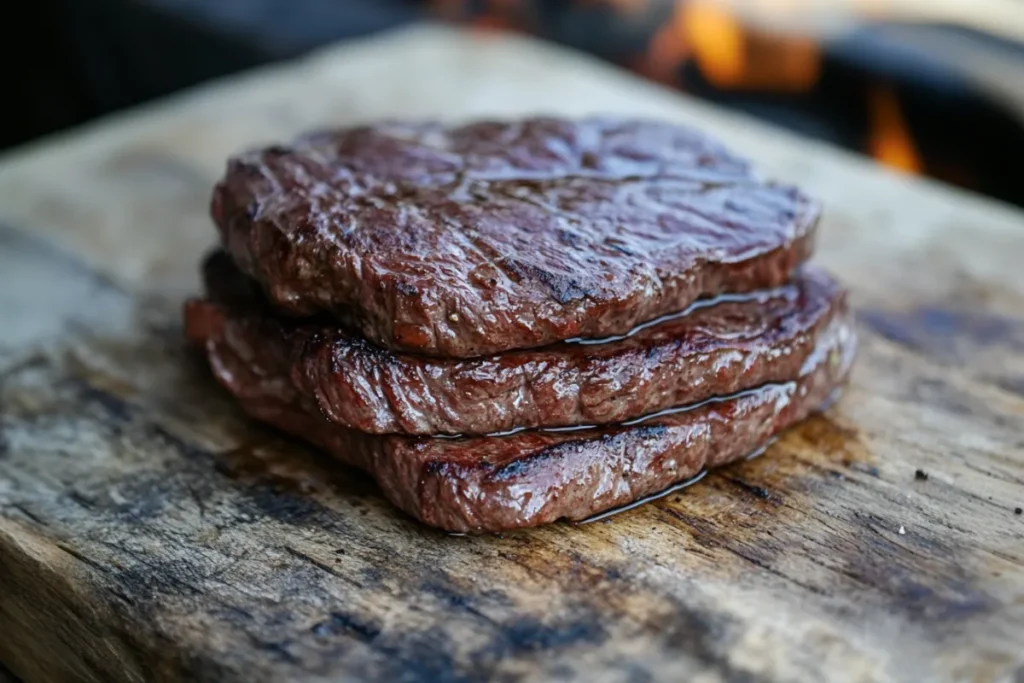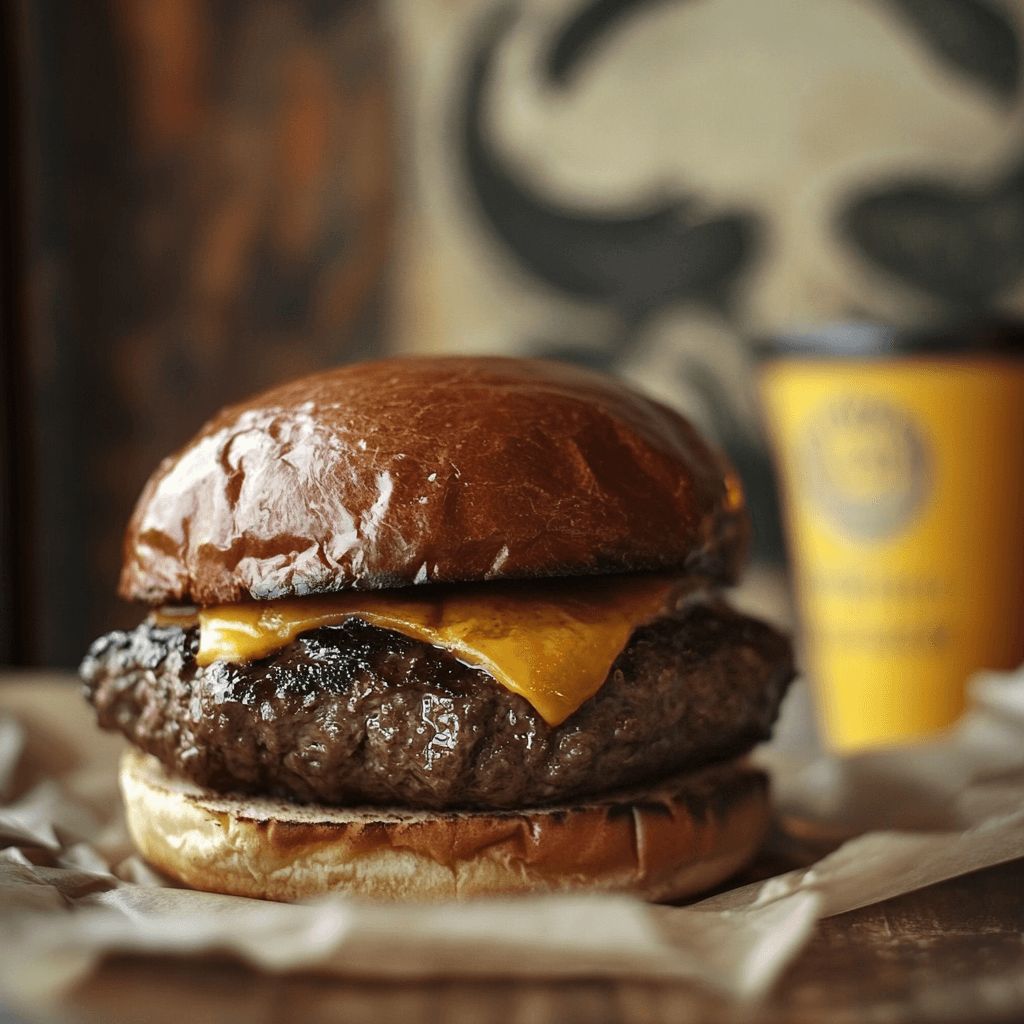As the demand for healthier and more sustainable food options increases, bison meat has gained popularity as a lean and nutrient-rich alternative to beef. Bison burgers provide a satisfying and flavorful option for those looking to reduce fat intake without sacrificing the taste of a juicy burger. But how does bison compare to beef when it comes to making burgers?
In this article, we will explore whether bison is a good choice for burgers, its health benefits, environmental impact, cooking techniques, and much more. Along the way, we’ll provide links to additional resources for further reading.
Is Bison Good for Burgers? A Healthier Alternative to Beef
One of the primary reasons people choose bison meat over beef is its superior nutritional profile. Bison is leaner, lower in calories, and packed with essential nutrients like protein, iron, and vitamin B12. According to a detailed nutritional comparison, here’s how bison stacks up against beef:
Bison Meat for Burgers: High in Protein, Low in Fat
- Bison: 124 calories, 2 grams of fat (per 3-ounce serving)
- Beef: 184 calories, 8 grams of fat (per 3-ounce serving)
- Bison: 17 grams of protein per serving
- Beef: 15 grams of protein per serving
How to Make the Best Bison Burger at Home
- Bison: Rich in iron and vitamin B12, both of which are essential for energy and healthy red blood cells.
- Beef: While beef also contains these nutrients, its higher fat content makes bison the healthier choice.
Choosing bison over beef can significantly reduce your intake of unhealthy fats while providing the protein and nutrients you need to stay strong and energized. For more information on the health benefits of bison burgers, check out this Introduction to Bison Burgers.
: Can You Substitute Bison for Beef in Burger Recipes?
- Lower in saturated fats: Reduces the risk of heart disease.
- Fewer calories: Ideal for weight management and low-calorie diets.
- High in protein: Supports muscle growth and repair.
- Rich in iron and B12: Helps prevent anemia and fatigue.
- Contains omega-3 fatty acids: Supports heart health and reduces inflammation.
Why Bison is a Leaner and Cleaner Choice

One of the major appeals of bison burgers is their lean nature. Bison meat contains less fat than beef, which makes it a cleaner, healthier option. Moreover, most bison are grass-fed, which means they’re not exposed to the growth hormones and antibiotics commonly used in conventional beef production.
Because of its cleaner, more natural production process, bison has become a popular choice for those seeking healthier, more ethical meat options. Additionally, bison is free from the hormones and antibiotics that are often a concern in industrial farming, making it a safer choice for health-conscious consumers.
Environmental Impact of Bison Farming
In addition to its health benefits, bison farming is considered more sustainable than conventional beef farming. Bison are indigenous to North America, and their grazing habits help maintain the health of grassland ecosystems. This makes bison a more environmentally friendly meat option.
Bison farming requires fewer resources than cattle farming. For example, bison consume less water and feed, making them a more efficient source of meat. Additionally, their grazing helps to restore ecosystems rather than deplete them, contributing to healthier environments.
For more details on how bison contributes to environmental sustainability, check out the World Wildlife Fund’s page on bison, which discusses their impact on ecosystems and conservation efforts.
Ethical Considerations
Beyond environmental benefits, bison farming is often considered more humane than conventional cattle farming. Bison are usually raised on open ranges, where they have ample space to roam. This contrasts sharply with the confined, crowded conditions of industrial feedlots in which cattle are often kept.
Supporting bison farming also contributes to wildlife conservation efforts. Bison were nearly driven to extinction in the 19th century, but conservation initiatives have helped restore their populations. When you choose bison meat, you’re supporting these efforts to preserve this iconic species and protect its natural habitat.
Nutritional Comparison of Bison vs. Beef for Burgers
When it comes to taste, bison meat offers a slightly sweeter and richer flavor than beef. Many people describe bison as having a cleaner, less greasy taste, which can be a refreshing alternative to traditional beef burgers.
However, the lean nature of bison can affect its texture. Because it contains less fat, bison meat can dry out more quickly if overcooked. The key to a juicy bison burger lies in careful cooking techniques, which we’ll cover in detail below.
Cooking Tips for Juicy Bison Burgers
Cooking bison burgers requires a bit more finesse than cooking beef because the leaner meat can dry out if not handled properly. Here are some essential tips to ensure your bison burgers come out tender and flavorful:
- Avoid overcooking: Because bison is leaner than beef, it can become dry if overcooked. Aim for a medium-rare or medium finish, and avoid cooking the meat beyond medium.
- Add moisture: To prevent the meat from drying out, consider adding a small amount of olive oil, butter, or bacon fat to the ground bison before forming your patties.
- Cook on medium heat: High heat can cause bison burgers to dry out quickly. Instead, cook your burgers over medium heat to achieve a perfect sear on the outside while keeping them juicy on the inside.
- Do not press the patties: Pressing down on the burgers while they cook forces out the juices, resulting in a dry burger.
- Rest the burgers: After cooking, allow your bison burgers to rest for a few minutes before serving. This helps the juices redistribute throughout the meat, making for a more flavorful burger.
For more detailed instructions, check out this bison burger recipe, which offers step-by-step guidance on how to make a perfectly cooked bison burger at home.
Bison Burgers in Restaurants and at Home

The popularity of bison burgers has increased in recent years, with more restaurants and food chains adding them to their menus. Many restaurants, such as Ted’s Montana Grill, have brought bison burgers into the spotlight by marketing them as a premium, gourmet option. These burgers are often advertised as a healthier, more sustainable alternative to traditional beef burgers.
At home, bison is now available in most health-conscious grocery stores and specialty markets. You can also find it through online meat suppliers. While bison is typically more expensive than beef, many people find the nutritional, environmental, and ethical benefits make it worth the higher price.
Bison Burgers and Special Diets
If you’re following a specific diet, bison can be a fantastic addition to your meal plans. Here’s why:
Paleo Diet
The Paleo diet emphasizes whole, unprocessed foods, including grass-fed meats. Bison fits perfectly within the Paleo framework, offering a high-protein, nutrient-dense option that supports muscle growth and repair.
Keto Diet
The Keto diet requires a high fat and low carbohydrate intake. While bison is leaner than beef, you can easily incorporate it into a Keto meal by adding high-fat toppings like avocado, cheese, or a drizzle of olive oil.
Whole30
The Whole30 diet focuses on whole foods and eliminates added sugars, grains, and dairy. Bison is a great fit for this diet, as it’s a natural, unprocessed meat that provides clean protein. Serve it alongside roasted vegetables or a fresh salad for a delicious and compliant meal.
Low-Fat Diets
For those on low-fat diets, bison is an ideal choice because it contains significantly less fat than beef. Its high protein content helps you feel full and satisfied without the extra calories.
FAQs About Bison Burgers
Here are some commonly asked questions about bison burgers:
- What does bison taste like?
Bison has a mildly sweet, rich flavor that’s similar to beef but leaner and less greasy. - Is bison healthier than beef?
Yes! Bison is lower in fat and calories while being high in protein and rich in nutrients like iron and B12. - How do you prevent bison burgers from drying out?
Avoid overcooking, and consider adding fats like olive oil or butter to keep the burgers juicy. - Can I substitute bison for beef in any burger recipe?
Absolutely! Bison can replace


